Subscribe to Pirate Wires Daily
A few weeks ago, hardly anyone had heard of Mentava, an education technology startup I founded in 2021. We were two years out from our seed fundraise, and more than a year away from our planned launch. With only five employees, we had been quietly building a minimum viable product and planned to iterate as we acquired users. Classic zero-to-one startup grind. But then, a single individual came into our orbit and radically accelerated our timeline overnight. Because of her, we acquired more customers than we could onboard within a week, launched our first product a year early, and are now watching two-year-olds learn to read using our software. Here’s the story of Mentava’s best marketer, and how she singlehandedly drove massive growth for our company.
Emily Mills is an extremely online progressive agitator and vocal left-wing conspiracy theorist who describes herself as a “random mom” and lives in San Francisco. She frequently posts about the city’s tech leaders, and holds one-sided grudges against people like venture capitalist Balaji Srinivasan and Pirate Wires’ own Mike Solana. I had no idea who Emily was until April 2 — a Tuesday — when one of her tweets appeared on my timeline: a post with screenshots from our 2022 fundraising deck, where she criticized our plan to teach Algebra I and II to 4th graders.
I had met plenty of people who opposed the idea of kids learning quickly. Whether it’s the elimination of middle-school algebra, the cancellation of honors classes, or the end of merit-based admissions, out-of-touch policymakers have been waging war on excellence in our schools. Mentava’s mission is to fight back against anti-merit activists with a software-based tutor to support high-achieving kids whose learning needs aren’t being met at school.
Emily was different, though. She seemed to take personal offense at the very idea of educating children. “Why do these folks want kids learning math so fast?” she wrote. In the tweet’s image, she had highlighted a post of mine on Hacker News where I argued that accelerating learning could get humanity closer to curing cancer, faster. “They want their labor and productivity to ’accelerate human achievement,’” she complained.
--
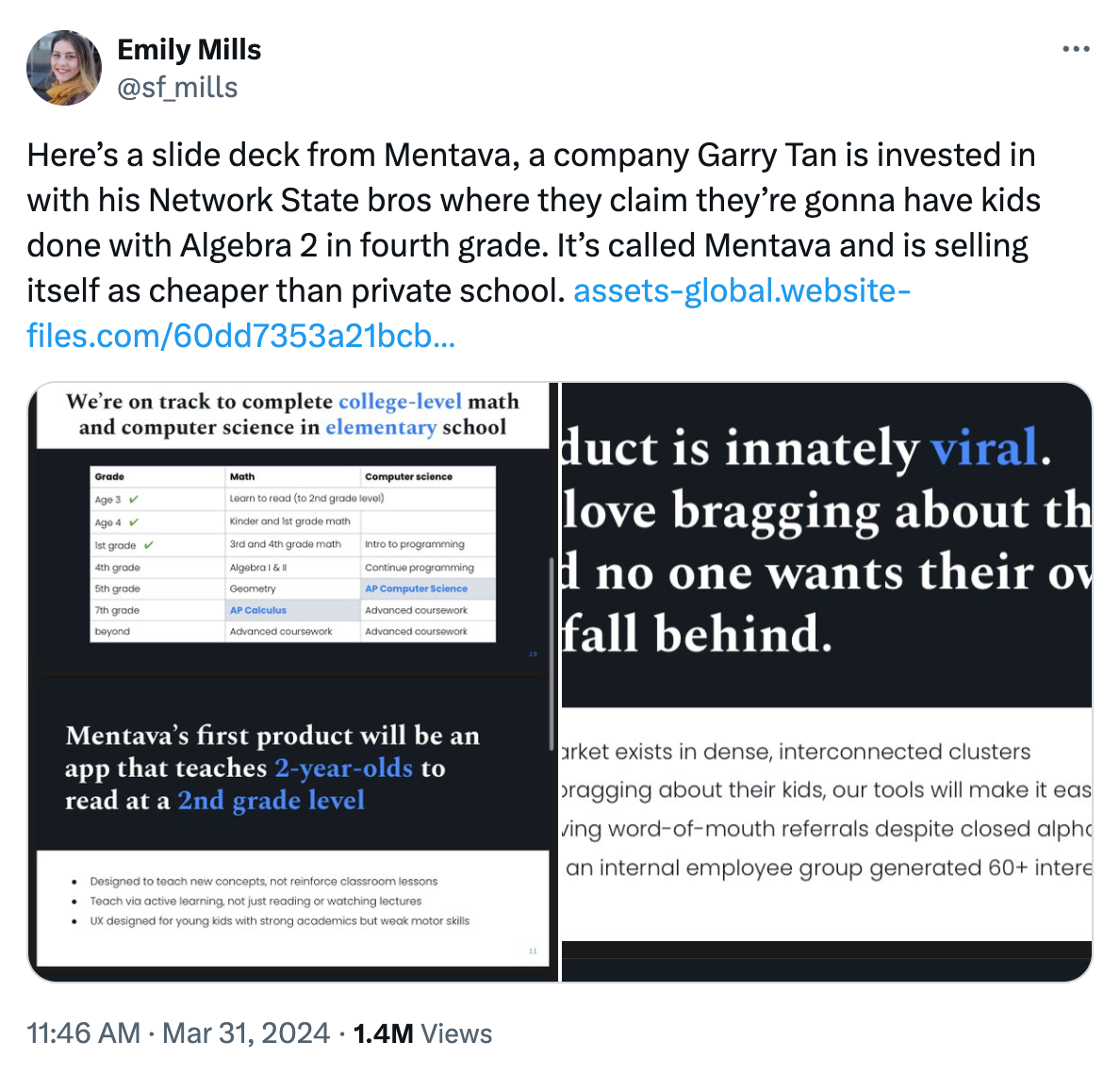
--
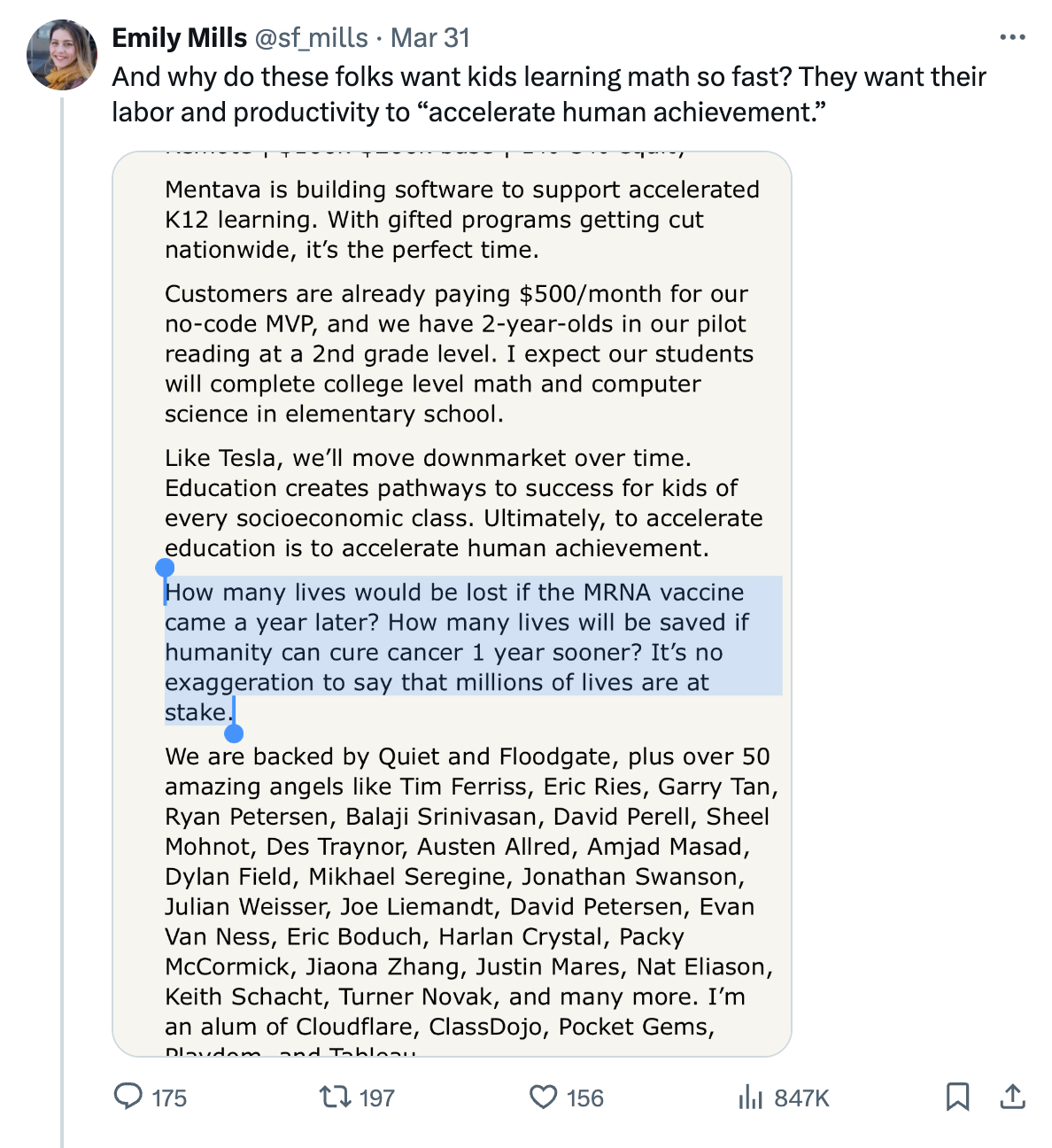
--
I was initially concerned by the unexpected criticism, but that feeling quickly turned into amusement. Her own followers appeared to be pretty confused by her thread. What exactly was Emily objecting to, they asked? The idea of kids learning math quickly? The possibility of curing cancer sooner?
Looking through her thread’s quote tweets, I found a great exchange with Noah Smith. He had quote tweeted it with the simple caption, “That sounds like a great idea!! Human achievement is awesome ❤️.” Emily responded, snarkily: “Ask them if you can invest, too!” I brought it up during our daily standup that morning, and we laughed about it as a team. After the meeting, I took a screenshot of the exchange and posted it myself. Our investors Garry Tan and Sheel Mohnot were some of the first people to retweet and comment.
This is when the real pile-on began. I had encouraged my team not to engage directly with Emily, as it seemed like there was a nonzero chance she was mentally ill. The rest of the internet, however, did not have that kind of restraint. Most comments were along the lines of “kids learning math fast sounds great, actually,” “curing cancer seems good,” or “advancing human achievement is a worthy mission.” A more self-aware person might have heard this criticism and deleted the tweets. But Emily doubled down, facing off against what she saw as an onslaught of “Network State bros” and “rich dudes exploiting children for labor.”
I didn’t get up from my computer until the pile-on finally slowed down, after midnight. By then, it was clear that our mission to accelerate education resonated far more broadly than we had ever expected. Before closing my laptop for the night, I sent one final message to the team: “It’s still going guys. Looks like we gotta accelerate launch, let’s figure out tomorrow how we’ll do it.”
--

--

--
By 9 AM Wednesday morning, we had collected over $25,000 from parents pre-paying their first month tuition to join our waitlist. I had woken up to messages in my inbox from parents who couldn’t find the signup link, and even from non-parents who wanted to know if they could make a deposit in advance of even having children. Just the fact that they’d managed to pay us at all was impressive — we hadn’t touched our website in two years and didn’t even know where the link to our checkout page was.
It was striking to see how deeply our mission resonated with them. Parents aren’t fools. They can tell when “educational” apps are junk food masquerading as healthy. They know they’re being lied to when politicians ban middle-school algebra and claim kids will magically catch up in high school. They also know they’re being lied to when policymakers cut accelerated and honors classes while telling them their kids will be just as challenged in regular classes. And they don’t buy the notion that by teaching to the lowest common denominator, all students will benefit as a result.
But what options do parents have? The cult of lowered standards is pervasive even in elite private schools. One hedge-fund manager told me about when he requested more challenging math for his bored 10-year-old. The school’s response? “There are plenty of families on our waitlist who would love to take your spot. If you don’t like our curriculum, you can go somewhere else.” That morning, it became clear to me that parents were fed-up, and they saw a lifeline in Mentava.
Up until Emily’s tweets, our plan had been to soft launch in about a year while we spent the next year iterating on the software with a small number of users. The first product we would launch would be a learn-to-read tutor aimed at two- to five-year-olds, and while we felt good about it (I had been using it with my own four-year-old daughter) we expected to polish it up before releasing it. We had a lot of confidence in our curriculum, but we were worried that our tutor wasn’t fun enough yet — our goal is to create a learning experience that kids beg for every day, and our current version still required some parental nudging and coaxing to keep kids on task. We weren’t sure how many families would see that as a deal-breaker.
Subscribe to Pirate Wires Daily
Even if we got to the point where we felt like our product was good enough, we knew we’d have to figure out how to sell it. We had no audience and no marketing budget, just a strong conviction that if we built something amazing, people would talk about it. So we expected our soft launch to be followed by another year of trying to find a viable marketing channel, with the hope that we could then scale up and get cash-flow positive before we ran out of money.
But that plan was crafted BE (Before Emily). We had been hoping to get 10 active families during the launch. But overnight, more than 50 had signed up. By 9 PM Wednesday night, we were cash-flow positive for the month. I sent the team a message before going to bed: “Change of plans, this is no longer a beta, this is full-on launch.”
--
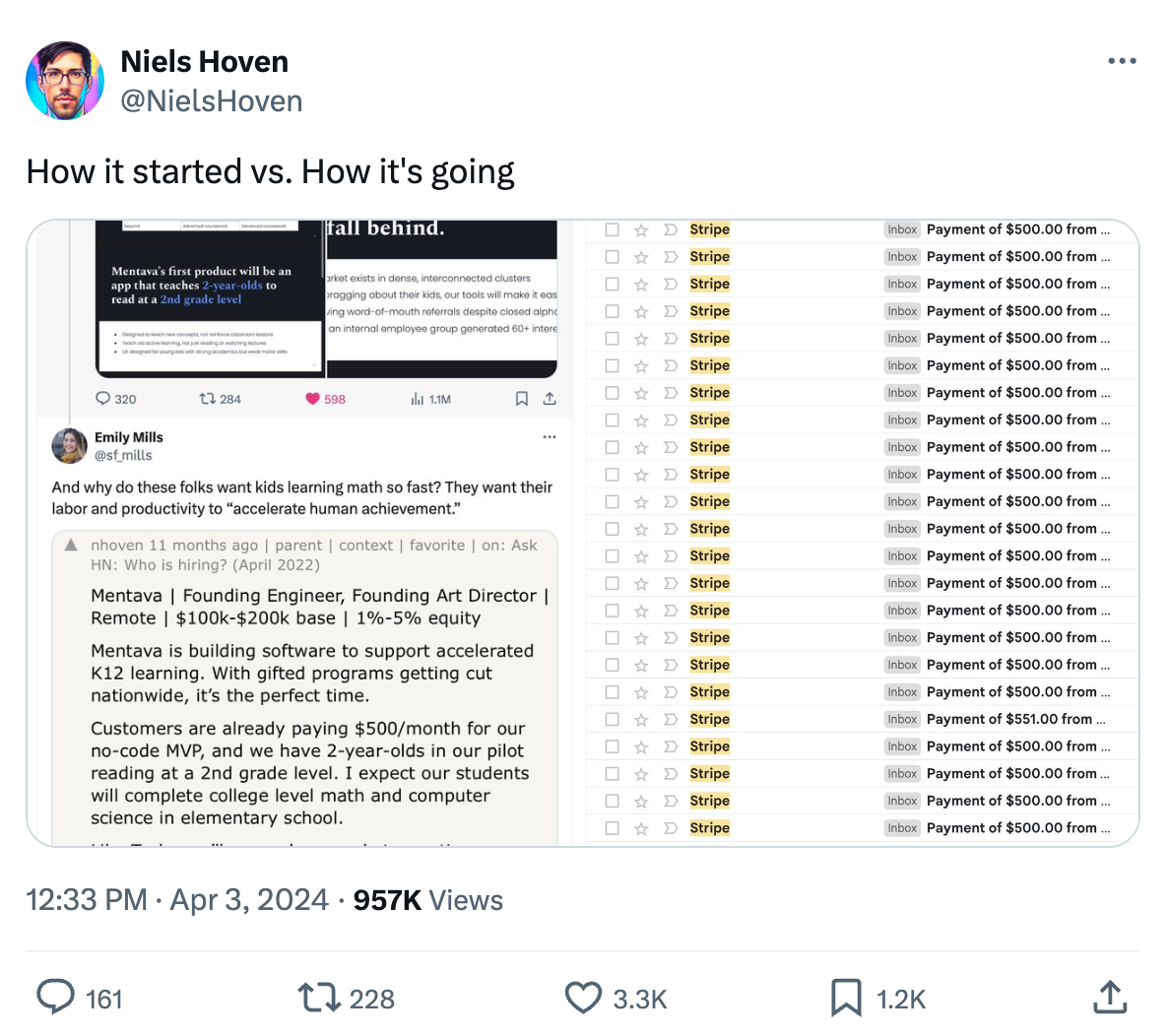
--
The next morning, the team gathered to figure out our new plan. We now had a user base of excited customers that we needed to keep, and it was time to figure out how to do that. We examined our situation. We had a learn-to-read tutor in which we were confident, but it wasn’t as fun as we wanted it to be yet. And we had no way for users to sign up, log in, or download our software, which we hadn’t even submitted to the App Store.
The situation felt dire, but our new plan was straightforward:
1) Manually enter all our new customers directly into our production database
2) Build login and signup
3) Submit a build to Apple as soon as we had a functioning log in flow
4) Conduct 1-on-1 onboarding calls with all customers to set expectations
5) Manage expectations with videos making it clear our software-based tutor is still a work in progress
6) Tweet a picture of our revenue with a banana
--
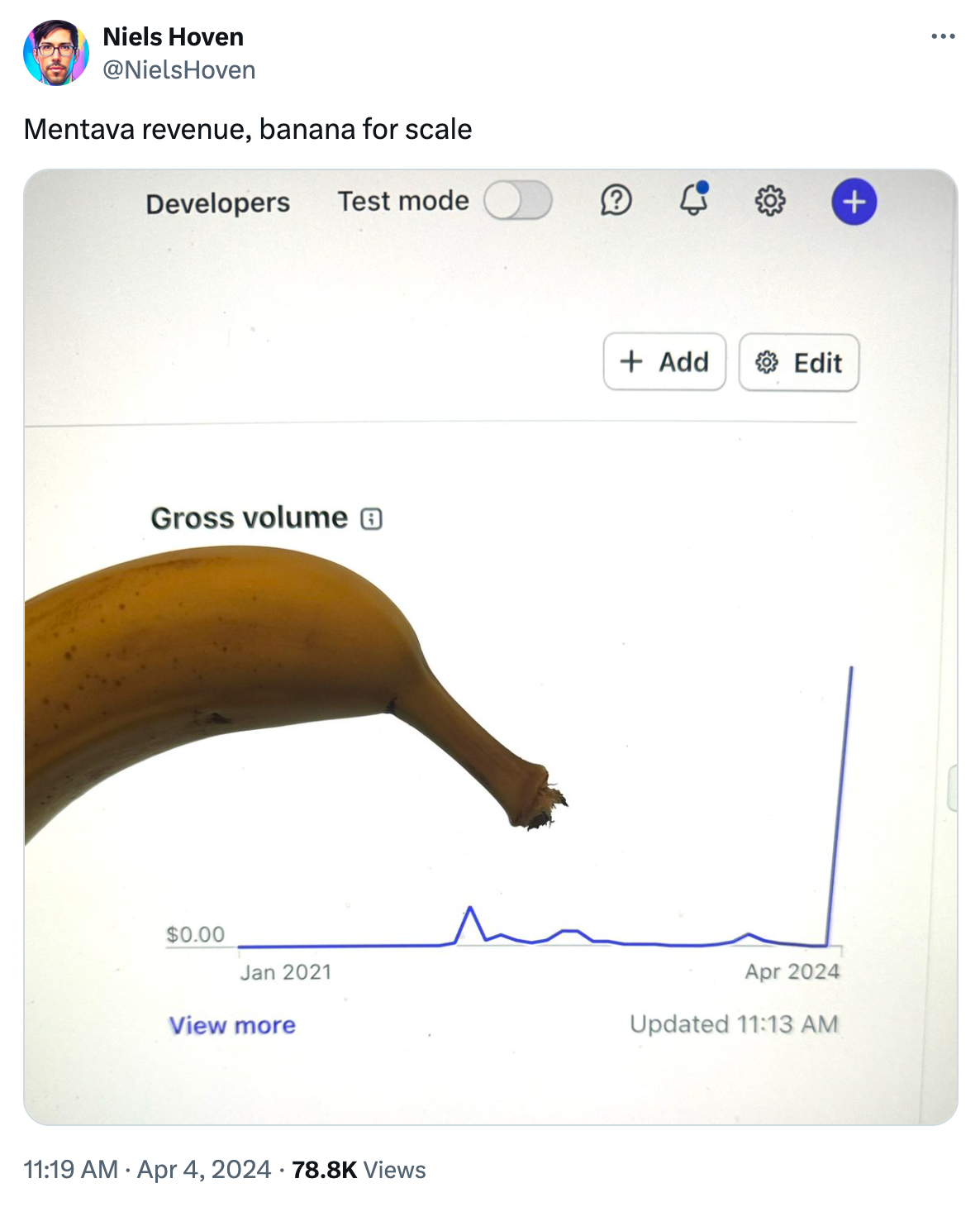
--
The team sprang to action. We scheduled onboarding calls with every customer who had signed up, starting that day and continuing through the weekend into the next week. If we hadn’t created their account by the time of the call, we told them we’d send them login info later. When every onboarding slot with me booked up, our product manager opened up his schedule and began leading them too.
We paused work on our sign-up flow, payments infrastructure, and web portal, since they were now of secondary importance to figuring out how to let our paying customers use our tutor. Instead, we spent the weekend manually entering our new customers directly into our production database and preparing to submit to Apple. And we finally found the checkout link that everyone had been using to pay us money.
--

--
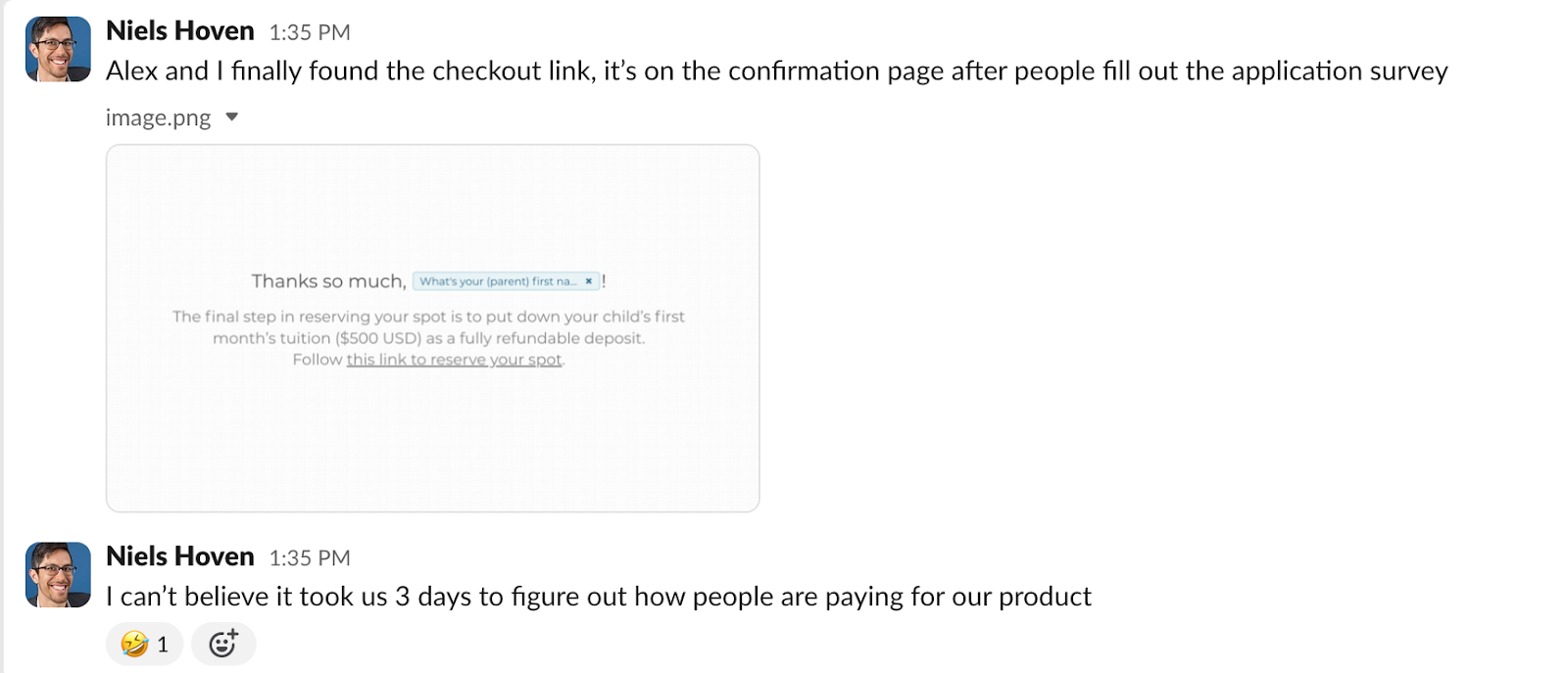
--
We spent Monday navigating Apple’s byzantine app submission process, and mostly got through it without any catastrophic errors. Our only serious mistake was accidentally shipping to both iPhone and iPad. We had intended to be iPad-only, but Apple doesn’t allow developers to revoke support for a device, so Mentava now supports iPhone too, which is a lot of extra work (oops).
From the moment we committed to launching, it took us less than a week to get customer-ready, pass Apple review, and go live on the App Store. It was a heroic effort, and I couldn’t be prouder of our five-person team. We didn’t one-shot the Apple Review process (that would have been incredible), but we only had to resubmit once — still pretty impressive for a first-time submission.
And fortunately, our customers have been amazing. I’ve cried more than once watching some of the videos our customers have sent us of their kids learning to read with Mentava.
Obviously, we got incredibly, absurdly lucky. Could we take any credit for how well the past several days had gone? There’s an old truism in poker that, over the course of a lifetime, everyone gets the same number of good and bad hands. What separates the winners from the losers is that good players win more on their good hands and lose less on their bad hands.
So did we play this hand well?
First, and probably most important, we had chosen to work on a problem that a lot of people care about. The fight to legalize excellence in our schools is one that resonates deeply with a broad range of families. So when anti-merit activists object to the idea of children learning quickly, it’s not hard to get a crowd to rally in defense.
Second, there have been pros and cons to our strategy of doing our seed fundraise as a party round, but it paid off big time last week. Having a small army of passionate supporters helped turn what could have been a petty Twitter feud into a national discussion.
Third, our pitch deck — the one with which Emily took issue — told our story well. It saved me a lot of time during our fundraise, but it also provided useful framing in case a critic linked to it out of context. My favorite comment during this entire saga was on Marginal Revolution, which read, “The Algebra 2 question completely undersells Mentava, which looks like it has a real chance of disrupting education because it is targeting the high achievers. It’s worthwhile to click through to the slide deck.”
Fourth, though we had been largely building in stealth mode, we had set up a small amount of customer-facing infrastructure, just in case. We had a website, mailing list signup, and checkout page. The website was a lightly modified webflow template, our email list was a basic Mailchimp account that we hadn’t touched in years, and our waitlist signup was just a no-code Stripe checkout page. But they existed, and that first week of April, that was all that mattered.
Ultimately, though, I doubt our unplanned launch would have been so exceptional without such a worthy opponent. Met with such universal ridicule, others would have quietly slunk away in shame. But Emily was willing to stand up for her beliefs, alone against the world, and for that we offer her our commendation, and our gratitude. May all of you be saddled with similarly competent critics.
— Niels Hoven
Subscribe to Pirate Wires Daily







